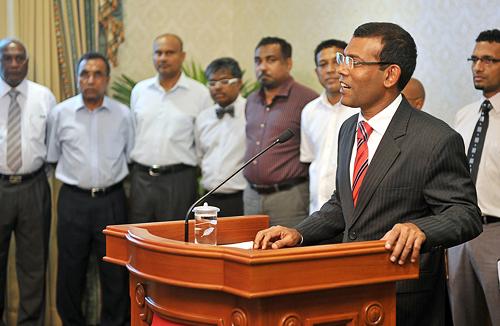Tourists alerted after Maldives unrest
 0 Comment(s)
0 Comment(s) Print
Print E-mail China Daily, February 8, 2012
E-mail China Daily, February 8, 2012
Chinese tourists are safe to travel in the Maldives but should stay alert after the country's first democratically elected president resigned on Tuesday following weeks of protests, according to the Chinese embassy in the Maldives.
Most of the Chinese tourists are on scattered islands and not the Maldives capital Male, where the protests occurred, a staff member of the embassy said. "They enquired about whether they can safely return to China as soon as possible."
"As far as I know, police haven't closed down roads or the airport," he said.
Male International Airport remains open, and most of the well-known local hotels in the Maldives are safe to stay at, said Liz Wu, a public relations representative for a group of luxury hotels in the Maldives.
The Maldives embassy in China also posted a notice on its weibo account (micro blog) saying it is safe for tourists to visit the Maldives since the transition to the country's new leader has been peaceful. The president was replaced by his vice-president.
The Chinese embassy has advised the Chinese Foreign Ministry and travel agencies to postpone or cancel trips to the Maldives. "After all, nobody knows if the situation change in the near future," the embassy said.
According to the Shanghai municipal tourism administration, around 370 tourists from Shanghai are stuck in the Maldives.
"Most travelers heading to the Maldives are individual travelers rather than group travelers," said Yao Shuoye, an official with the administration. "But we do have their information. At least we know which hotels they're staying at as all of these tourists booked the hotels and flights through local travel agencies."
The administration asked local travel agencies to keep tourists informed about the Maldives' situation and to avoid visiting Male.
"Male is not at all the major attraction of the Maldives ,and that's why most tourists wouldn't stay there for long. It's only a transfer point," said Wang Fang, general manager of Shanghai Jinjiang International Travel Co Ltd's outbound department.
Tourists have not made any emergency calls from the Maldives, so it's too early to determine what effect the leadership shakeup will have on the tourism industry, said a manager at the Beijing-based BTG International Travel and Tours, who only gave his surname as Ma.
Ma said it's unlikely that the incident will change the image of the Maldives, which is seen as a popular destination for international tourists.
"Unlike the Spring Festival, it is not the peak season for Chinese tourism to go to the Maldives," said Li Lan, who is in charge of the Maldives-bound tour business at the Beijing office of the China Travel Service.
Some Shanghai tourists planning to visit the Maldives adopted a "wait and see" attitude. "I won't easily cancel the trip with my husband there in May," said Maple Yang. "We have purchased the tourist insurance."
The Maldives, with 350,000 people, comprises 1,192 low-lying islands - of which only 200 are inhabited. About 100 islands are resorts, generally with isles to themselves.
Tourism is the Maldives' largest industry, accounting for a third of GDP and more than 60 percent of foreign currency earnings. Some 90 percent of government tax revenues come from import duties and tourism.
More than 198,000 Chinese tourists visited the state in 2011, up 67 percent year-on-year, according to Maldives' official statistics.






